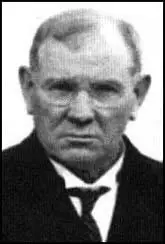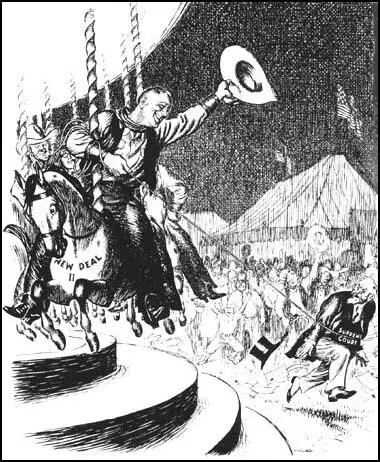Pierce Butler

Pierce Butler was born in Northfield, Minnesota, on 17th March, 1866. Admitted to the bar in 1888 he served as assistant county attorney in St Paul, before forming his own law firm. Over the next twenty-five years Butler established himself as one of the country's leading railroad attorneys.
When William Taft became president, his attorney general, George Wickersham, employed Butler to prosecute some anti-trust cases. In 1922 President Warren Harding appointed him to the Supreme Court. Butler reactionary political views were well-known and his appointment was challenged by leading progressives such as George Norris and Robert La Follette.
Butler was a conservative justice and was consistent in his opposistion to progressive taxation, welfare legislation, and attempts to control the freedom of America's large corporations. Franklin D. Roosevelt, the Democratic Party candidate, was elected as president in 1932. Over the next few years Butler and the other justices who were supporters of the Republican Party, ruled against the National Recovery Administration (NRA), the Agricultural Adjustment Act (AAA) and ten other New Deal laws.
On 2nd February, 1937, Franklin D. Roosevelt made a speech attacking the Supreme Court for its actions over New Deal legislation. He pointed out that seven of the nine judges (Butler, Charles Hughes, George Sutherland, Willis Van Devanter, Harlan Stone, Owen Roberts and Benjamin Cardozo) had been appointed by Republican presidents. Roosevelt had just won re-election by 10,000,000 votes and resented the fact that the justices could veto legislation that clearly had the support of the vast majority of the public.
Roosevelt suggested that the age was a major problem as six of the judges were over 70 (Butler, Charles Hughes, Willis Van Devanter, James McReynolds, Louis Brandeis and George Sutherland). Roosevelt announced that he was going to ask Congress to pass a bill enabling the president to expand the Supreme Court by adding one new judge, up to a maximum off six, for every current judge over the age of 70.

Charles Hughes realised that Roosevelt's Court Reorganization Bill would result in the Supreme Court coming under the control of the Democratic Party. His first move was to arrange for a letter written by him to be published by Burton Wheeler, chairman of the Judiciary Committee. In the letter Hughes cogently refuted all the claims made by Franklin D. Roosevelt.
However, behind the scenes Charles Hughes was busy doing deals to make sure that Roosevelt's bill would be defeated in Congress. On 29th March, Owen Roberts announced that he had changed his mind about voting against minimum wage legislation. Hughes also reversed his opinion on the Social Security Act and the National Labour Relations Act (NLRA) and by a 5-4 vote they were now declared to be constitutional.
Then Willis Van Devanter, probably the most conservative of the justices, announced his intention to resign. He was replaced by Hugo Black, a member of the Democratic Party and a strong supporter of the New Deal. In July, 1937, Congress defeated the Court Reorganization Bill by 70-20. However, Roosevelt had the satisfaction of knowing he had a Supreme Court that was now less likely to block his legislation.
Pierce Butler refused to retire and was still a member of the Supreme Court when he died in Washington on 16th November, 1939.
